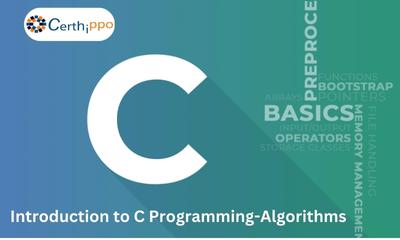
Introduction to C Programming-AlgorithmsC programming is a widely used programming language known for its efficiency and low-level programming capabilities. It is particularly popular for system programming, embedded systems, and developing applications that require direct access to hardware resources. In this introduction to C programming, we'll focus on the role of algorithms in C programming.
Algorithms are step-by-step procedures or sets of instructions designed to solve specific problems or perform tasks. In C programming, algorithms play a crucial role in designing efficient and effective solutions. Here are a few key points to understand about algorithms in the context of C programming:
Problem Solving: Algorithms are used to break down complex problems into manageable steps. They help identify the logic and sequence of operations needed to solve a given problem. Whether it's sorting a list of numbers, searching for an element in an array, or manipulating data structures, algorithms provide a structured approach to problem-solving.
Efficiency: C programming places a strong emphasis on efficiency, making it essential to design algorithms that are efficient in terms of time and space complexity. Efficient algorithms ensure optimal use of system resources, enabling programs to execute quickly and handle large datasets or complex operations effectively.
Data Structures: Algorithms in C programming often work in conjunction with data structures. Data structures define how data is organized, stored, and accessed in memory. Common data structures in C include arrays, linked lists, stacks, queues, and trees. Algorithms provide operations and techniques to manipulate and utilize these data structures effectively.
Algorithm Analysis: Analyzing the performance of algorithms is crucial to determine their efficiency and scalability. This involves evaluating their time and space complexity, commonly expressed using big O notation. Understanding algorithm analysis helps in selecting the most suitable algorithm for a given problem, considering factors such as input size and available system resources
Libraries and Frameworks: C programming provides various libraries and frameworks that offer pre-implemented algorithms and data structures. These libraries, such as the Standard Template Library (STL) in C++, provide a collection of reusable algorithms and data structures, saving developers time and effort in implementing them from scratch.
Optimization: C programming allows for low-level optimizations and fine-tuning of algorithms. This includes optimizing code execution, memory management, and utilizing specific hardware features. C's close-to-the-hardware nature gives developers more control and flexibility in optimizing algorithms for specific platforms or performance requirements.
Understanding algorithms and their implementation in C programming is fundamental to becoming a proficient developer. It involves learning key algorithms, data structures, algorithm analysis techniques, and applying them to solve real-world problems efficiently. Mastering algorithms in C programming empowers developers to write robust and performant code that meets the demands of various applications and systems.

Certhippo is a high end IT services, training & consulting organization providing IT services, training & consulting in the field of Cloud Coumputing.
CertHippo 16192 Coastal Hwy, Lewes, Delaware 19958, USA
CALL US : +1 302 956 2015 (USA)
EMAIL : info@certhippo.com








Courses Category
Job Support | Interview Preparation | Profile Marketing | Resume Preparation | Certificate Assistance | Courses | ACFE | TerraForm | JIRA | IBBA | ASQ | ACAMS | ASCM | The Open Group | Check Point | Product Trainings | Security Operations Center | Cloud Security Alliance | Data Privacy | IAPP | ISO | (ISC)² | PMI | SALESFORCE | SPLUNK | CISCO | ISACA | AWS | EC-Council | CompTIA | MICROSOFT | Other | Frontend Development | Architecture & Design Patterns | Operating Systems | Mobile Development | Databases | Blockchain | Digital Marketing | Artificial Intelligence | Robotic Process Automation | Data Warehousing and ETL | Programming & Frameworks | Big Data | Project Management and Methodologies | Software Testing | Data Science | Cyber Security | BI and Visualization | DevOPS | Cloud Computing |